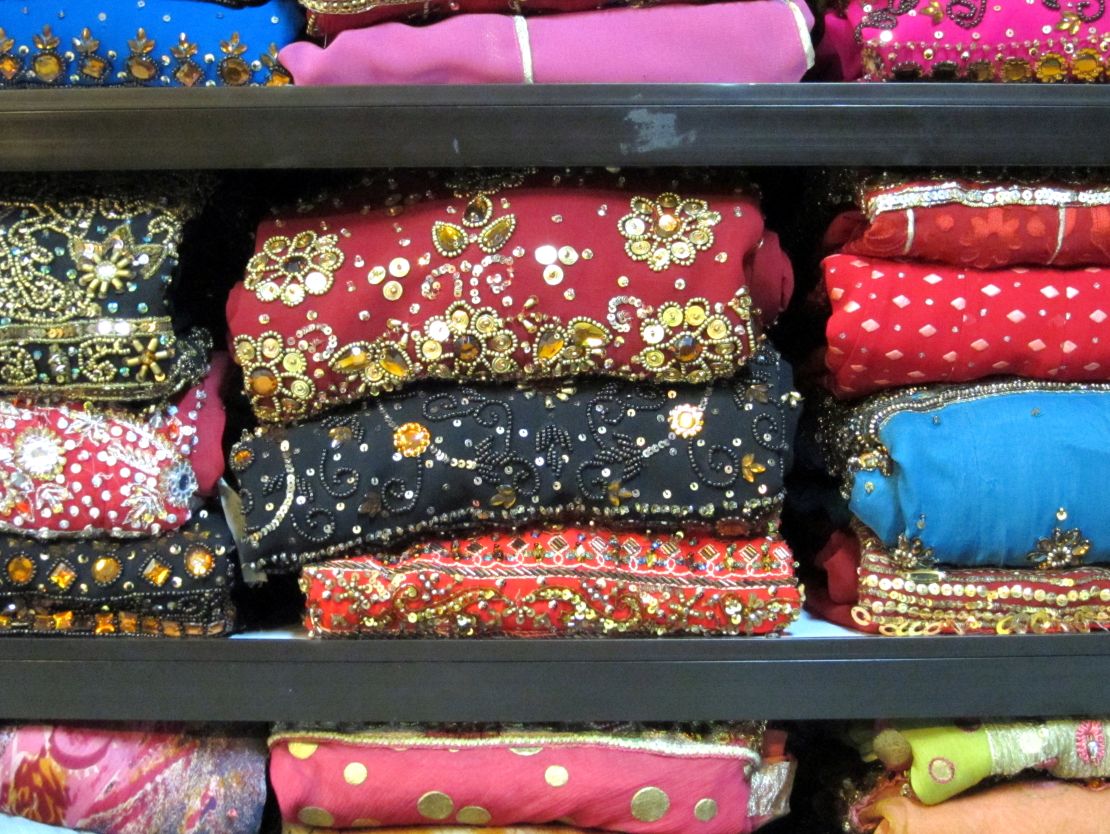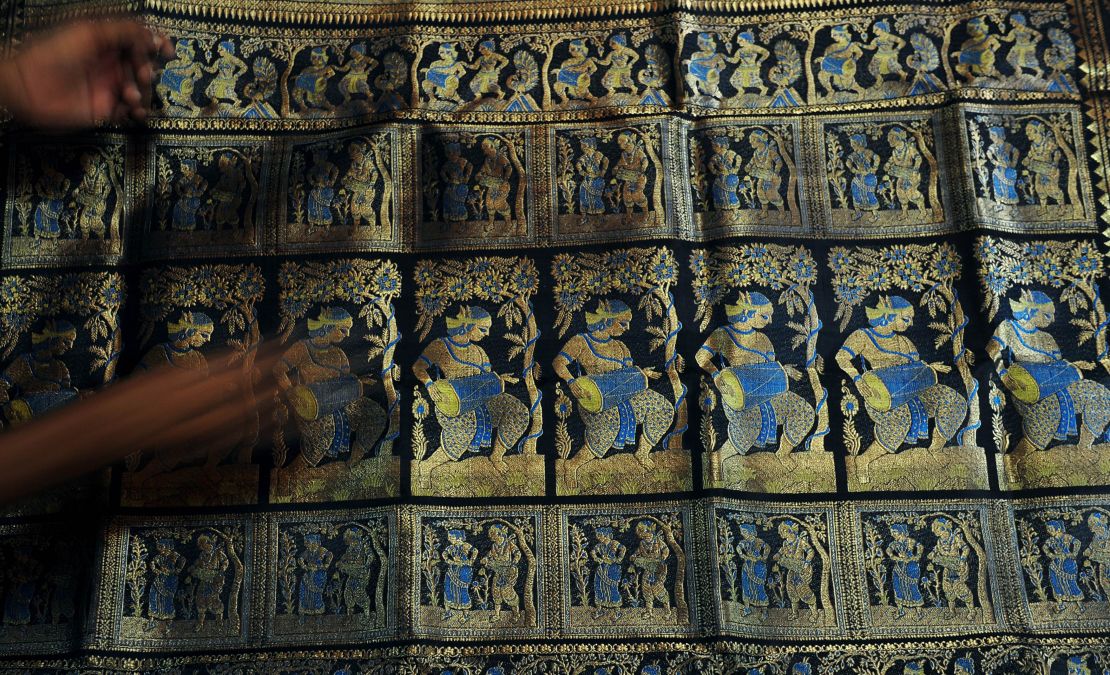The prestitched sari is a wonderful thing for obvious reasons.
But if you’re a purist and would rather drape and pleat than slip in and out, you need to follow this guide to Mumbai’s six best sari shops.
1. Kala Niketan
If sari-anxiety is a condition, Kala Niketan certainly induces it.
In crunch-infested Mumbai, the two stores at Marine Line and Juhu occupy over 3,700 square meters. And both are lined, wall to wall and floor to ceiling, with saris and salwar kameez materials.
There’s a reason why the lovely ladies list it as one of the city’s best sari shops: variety.
From Benarasi weaves to south silks, cotton, bandhini and printed to the new fangled embroidered and sequined numbers, they take comfort in quantity.
From behind cloth topped counters, men – some young, mostly old – unravel, pile, slide and fold saris with the same expression. Occasionally they’ll break into a smile when a young woman makes a risque comment about her blouse design.
2. Nalli

A few months ago, when a Malyalee friend from Mumbai decided to get married, she promptly booked her tickets to Chennai. She was clear her wedding sari had to come from the original Nalli sari shop.
Those of us who’d rather stay within city limits to satiate our desire for South Indian Kanjeevaram silks, the Mumbai Nalli is foolproof.
Though the store is spread over three floors, it’s the ground level that remains special. This is where the silk saris with gold-colored weaves rest. The price depends on whether the thread used is artificial, silver dipped in gold or real gold zari.
Though workers at stores are almost always helpful, the ones at Nalli are particularly earnest. They’ll drape the sari on you and then drape it on themselves.
If you still don’t appear convinced, they’ll offer you a cup of their special south Indian filter coffee.
Mumbai: Insider Travel Guide Mumbai
3. Warp ‘n’ Weft
Don’t be fooled by its size. Or its weather-beaten signboard. In this split level space, Sagrika Rai’s sari shop not only stocks the city’s best Benarasi saris, she happily gives customers a crash course in weaving techniques.
“I’ve been trying to revive old Indian motifs like Shikargah (woven sari with animal and bird imagery),” says Rai.
Unnecessary sequins, haphazard zari borders and embroidery are all banned from the handwoven saris at Warp ‘n’ Weft.
Only intricate weaves with traditional motifs like paisleys, kamal booti and jangla (twine) pass the test. Though people in Mumbai often equate Benarasi saris to heavy silk, the one here, in materials like silk, cotton, tussar and georgette, are extremely light weight.
“This is what real Benarasi weaves feel like,” says Rai.
Though yellows and reds (haldi and kumkum colours) have been favorites this season, it’s the whites and beiges that are always in favor.
4. Khatri Jamnadas Bechardas
Two years ago when sari shop Khatri Jamnadas Bechardas celebrated its centenary, they had to slam the doors shut because they hadn’t expected the crowd.
Fancy mannequins and shiny billboards may be missing from the store, but ask any Gujarati or Marwari shopper worth her purse and she’ll direct you here for the city’s best bandhini saris.
Made using the tie-and-dye method, a bandhini sari’s quality is determined by how closely it is tied. This is also why it’s seriously difficult to put them on display. At Jamnadas, instead of a glass display, the saris are wrapped in cloth bundles so that they retain their wound up pattern for longer.
Bandhinis in all colors and materials abound here. But this sari shop is especially sought after for its wedding and occasion wear like the Gharchola (sari with red checks and gold thread) and Panetar (red and white checks).
5. Sagar

After an aesthetically tragic period of embroidered saris being popular, Sumit Jain from Sagar is happy to announce that woven saris are back.
“People have been choosing simple saris with interesting borders,” he says.
There’s a good chance that if you ask someone between Bandra and Santacruz for a sari shop, they’ll direct you to Sagar. Started in 1963, the store started with just 27 square meters of space. It’s spread over two floors now. The location though has remained the same.
Prints, the perennial favorites, are given as much weightage as the money generators, the embroidered ones. In between these, Sagar sources and sells cotton, georgette, net and silk.
Unlike many places that only give a blouse piece but not a real blouse, Sagar sari shop has in-house tailors to stitch those tricky pieces of clothing.
6. Dadar market
To pick one shop here would be grossly unfair. For over four decades, the market near Plaza cinema has been taking care of the wardrobes of Dadar’s women.
Keeping the road cozy, stores line both sides. Lazaree, Paaneri and Rangoli Annexe face Roopmilan and Dadar Emporium. Though these originally catered to the middle class Maharashtrian population of the area, in recent years curious sari shoppers have been dropping in too.
Their biggest selling point is the price that remains affordable. Even though stores like Lazaree and Paaneri have upped the ante by getting fancier mannequins and stationing guards, they haven’t lost sight of their working class customer.
This market is also the best bet for sari shops that sell the traditional Maharashtrian nine-yard Navvari sari – which, by the way, is the original Mumbai sari style.
Jhilmil Motihar is a freelance features writer, people-watcher and traveler.
Editor’s note: This article was previously published in 2012. It was reformatted and republished in 2017.



